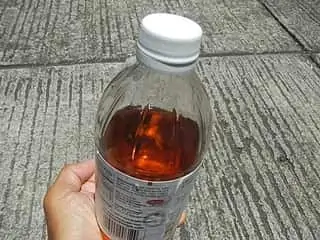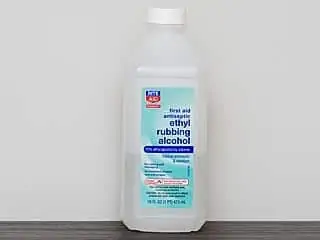I read in a magazine last year in which vinegar was regarded as a holy grail if you want to save house plants so, me being me, watered my house plants with vinegar, without any research and later, I had to buy a lot of new plants because my old plants died, each one of them.
Can you spray houseplants with Alcohol or vinegar? The answer is Yes and No. Using household vinegar on your houseplants is not recommended, spray it around the plant, not on it, it turns the leaves yellow and damages the plant. Alcohol is safe to spray on plants for pests as long as it is diluted.
So now that you know using vinegar and Alcohol for your plant is not as simple as it sounds. Let me break it to you and explain both the things one by one. Keep reading for whole loads of goodness for your plants.
Table of Contents
Why Should You Not Use Vinegar on Your Houseplants?

There are many reasons why you should not be using vinegar on your plants, but some plants flourish in an acidic environment, but those are pretty rare; other than that, all your houseplants will be at threat with your house vinegar. So, let’s find out all the reasons why you should not be using vinegar for your house plants.
Young Plants
Young plants are far more prone to damage from vinegar, just like a newborn child is more prone to catching infections or diseases. If you spray apple cider vinegar on the leaves of these young plants, they will immediately turn yellow and will die. You have to cut those wilted leaves; otherwise, it will kill your whole plant.
Moreover, if you ever water your young plant’s roots with vinegar, it will die with no hope for recovery as the roots will absorb the vinegar, and this will affect the whole plant altogether; how tragic is that no?
Old Plants
If you sprayed vinegar on an old plant accidentally or foolishly, then don’t worry; there is still some hope left for you there. Old plants are equally damaged by vinegar spraying, but they tend to recover quickly, so they are strong lads. Even if you see lots of damage on the plants, they will recover by the end of the season because of their old age.
Dry Out the Leaves
The vinegar that we have at the house has a concentration of around 5%-8% acetic acid. If you spray your plants with vinegar, that acetic acid will react with the walls of the leaf and leave them dried out. In this case, you can just cut the leaf out before it damages the whole plant.
Ways To Use Vinegar on Your House Plant Without Damaging It
There are a few ways with which you can use vinegar to repel pests without damaging your plants.
Use Cloth Soaked in Vinegar
If your primary concern is pests and bugs, then this method will help you quite a lot. You have to take a simple cloth, soak it in household vinegar and cover the walls of your pot with that cloth. The pungent smell coming from the fabric will repel most of the pests.
Use Cotton Balls
It is another way to look for a slight strong repulsion as a cloth soaked in vinegar is subtle. So, you take a few cotton balls, soak them in vinegar, drain all the vinegar water out of them and then put those balls inside your pot. Make sure that you have drained all the water; otherwise, the water may reach the roots, which will not be helpful at all.
Use It on Houseplants Immune To Vinegar
If you want to use vinegar on houseplants, use it on specific plants that do not get harmed by it. Some plants even love vinegar as they like a little acidic environment around them. Azaleas, Camellias, and Cactus are some of these plants.
Should You Use Alcohol on Household Plants?

Yes, you can use Alcohol on your house plants, but you will be playing with fire by doing so. Though using Alcohol does not harm your plant as much as vinegar, you should be a little cautious while using it because a higher quantity of Alcohol is also as damaging as vinegar.
- Make sure to dilute your Alcohol because it is the most crucial part is you would never want your plant to die due to strong Alcohol.
- Watering is a must before adding Alcohol as your plant will be losing quite a lot of water because of the Alcohol.
- Take a container or pitcher and add nine parts of water
- Now add 1 part of Alcohol in your water and make your diluted Alcohol
Spray that to your plants, but not a lot; it will repel mealybugs and other crawling pests.
What Can Alcohol Potentially Do to Your House Plants?
Alcohol can burn your leaves if it is not diluted correctly or used in higher concentrations directly on the leaves. You should never use beer, wine, or any type of Alcohol that has sugar in it. Sugary Alcohol is just going to worsen the condition of your plant, and it will also provide a playing ground to bacteria and fungi.
Alcohol is commonly used to restrict or control plants’ growth so if you are using rubbing alcohol or ethanol, keep in mind that your plant will grow slower than usual. But if you aim to control the growth of your houseplants so that you can keep them in your house for longer, then Alcohol is ideal for you.
Never add your Alcohol to the potting mix because if your soil has Alcohol, your plant will never grow in it. Let your plant grow, and then use Alcohol to kill the weed or repel the pests.
You need to realize that no matter what, Alcohol will damage your plant one way or another. Is it safe to use? Yes, safer than vinegar, but that does not mean you should use it as there are tons of pesticides available in the market that can kill worms and mealybugs without harming your plants, so make sure to choose a reliable way.
Conclusion
Lastly, I hope this little guide helped you in making your house plants healthier and happier. Take care of them and keep in mind that everything you read in magazines is not always true, so do not compromise your plant’s health for it. Wishing you luck, have a pleasant evening full of plants!
Recent Posts
Have you found yourself wondering, 'why is my bamboo growing so slow?' Despite the fact that bamboo plants are remarkably fast-growing, it can sometimes take months (or even years!) to see any signs...
Miracle-Gro is a huge help when you are trying to get decent yields out of your plants or if you want them to thrive. However, you may have noticed that a single dose of fertilizer does little to...
